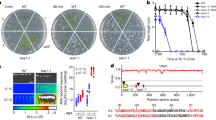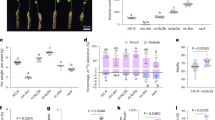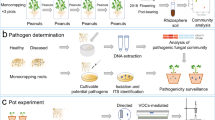Abstract
“RUBBING” (“shearing”) is a mechanical process used to separate the fruit clusters of Beta vulgaris L. (sugar beet or beetroot) into more or less even-sized segments, each with one or two seeds, by grinding away some of the hard tissue surrounding the seeds with an assembly of abrasive disks. The investigation here reported followed the almost complete failure of a rubbed sample of beetroot seeds to germinate in a field in which a different rubbed sample of the same cultivar (‘Detroit Globe’), sown at the same time, germinated satisfactorily. Neither sample contained any obviously damaged seeds and no damage was found when embryos excised from imbibed seeds were examined under the microscope. Natural (unrubbed) seeds from the same sources (Lot 1, good; Lot 2, bad) were later obtained. In a series of laboratory experiments we found that: (1) Germination of unwashed seeds can be depressed by insufficient moisture (Fig. 1A). (2) When beetroot seeds are washed and then immediately placed on wet filter paper scarcely any will germinate; but if they are washed, dried and then placed on moist filter paper they germinate well (Table 1), (3) Similarly, germination can be depressed when seeds are placed on a substrate which is even slightly wetter than necessary (Fig. 1); this effect is particularly pronounced with unwashed seeds (Fig. 1A) but can be alleviated by adding small quantities of hydrogen peroxide (Table 2). Warburg respirometer results show that the respiration of beet seeds is appreciably suppressed in a slight excess of water. (4) Natural seeds from Lot 2 germinate at least as satisfactorily as seeds from Lot 1, but rubbing depresses the performance of seeds from Lot 2, though not of those from Lot 1 (Fig. 1B). (5) Shaking the seeds for 45 min in a glass bottle has an effect on germination similar to that of rubbing (Fig. 1C). (6) Soaking the seeds in 4 p.p.m. gibberellin, followed by drying, lessens the effect of a certain level of excess moisture on germination, especially of rubbed or shaken seeds (Figs. 1C, 1D). (7) In the triphenyl tetrazolium chloride (TTC) test, in which intact cells stain red because of their dehydrogenase activity and damaged cells remain unstained, embryos from intact beetroot seeds are stained uniformly, but embryos from rubbed and shaken seeds are not. On the other hand, treatment of rubbed or shaken seeds with 4 p.p.m. gibberellin largely restores the capacity of their embryos to stain red (Table 3) in response to TTC.
This is a preview of subscription content, access via your institution
Access options
Subscribe to this journal
Receive 51 print issues and online access
$199.00 per year
only $3.90 per issue
Buy this article
- Purchase on Springer Link
- Instant access to full article PDF
Prices may be subject to local taxes which are calculated during checkout
Similar content being viewed by others
References
De Kock, P. C., Hunter, R. F., and MacDonald, I. R., J. Exp. Bot., 4, 272 (1953).
Fröschel, P., Natuurwetensch. Tijdschr., 37, 97 (1955).
MacKay, D. B., and Tonkin, J. H. B., Proc. Intern. Seed Test. Assoc., 30, 601 (1965).
Barthodeiszky, A., Gaspar, S., and Kiss, E., Proc. Intern. Seed Test. Assoc., 30, 677 (1965).
Author information
Authors and Affiliations
Rights and permissions
About this article
Cite this article
CHETRAM, R., HEYDECKER, W. Moisture Sensitivity, Mechanical Injury and Gibberellin Treatment of Beta vulgaris Seeds. Nature 215, 210–211 (1967). https://doi.org/10.1038/215210a0
Received:
Issue Date:
DOI: https://doi.org/10.1038/215210a0
This article is cited by
Comments
By submitting a comment you agree to abide by our Terms and Community Guidelines. If you find something abusive or that does not comply with our terms or guidelines please flag it as inappropriate.



